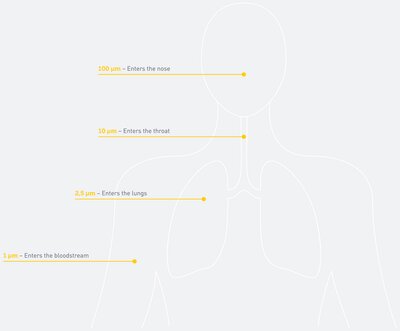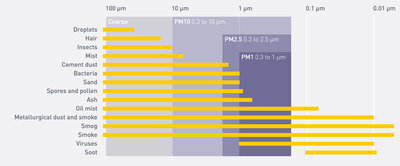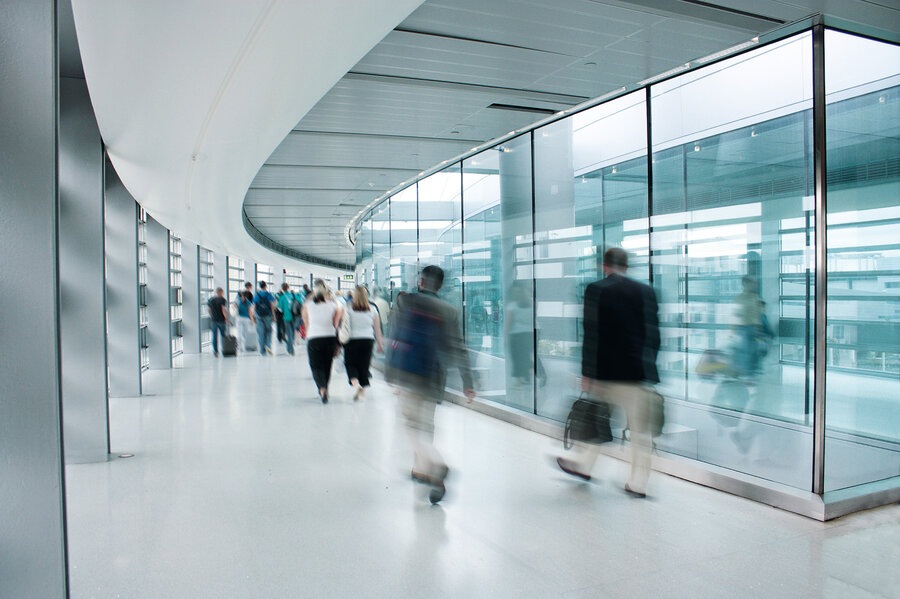We spend 90 percent of our time indoors. On average - sometimes even more. At home, in the office, in public facilities, we are constantly indoors. And while we often focus on the air outside, we rarely think about indoor air quality. However, pollutants in the outdoor air - such as particulate matter, nitrogen oxides or volatile organic compounds - can enter indoor spaces unhindered and have a significant impact on our health and well-being if they are not filtered.
Particulate matter is particularly harmful to our health. Particulate matter is a collective term for small particles in the air with a diameter of less than 10 micrometers (µm). Although these particles are invisible to us, they pose a major threat to our health. This is because the smallest fine dust particles can get into our throat, our lungs or, if they are small enough (1 µm), even into our bloodstream. You can find out more about particle sizes here.

Polluted air, sick people: The health consequences of poor indoor air
Polluted indoor air brings with it a variety of health risks that can have both acute and chronic effects. Acute symptoms include headaches or tiredness, while chronic consequences include allergies triggered by pollen or mold spores or respiratory diseases such as asthma or COPD. All of these can be triggered or aggravated by particulate matter or volatile organic compounds (VOCs).
Particularly small particles (especially PM2.5, i.e. particles smaller than 2.5 μm) are associated with an increased risk of heart attacks and strokes in the longer term. Prolonged exposure to air pollutants such as certain VOCs is also associated with an increased risk of cancer.

However, the effects of poor indoor air quality (IAQ) are not limited to physical illnesses. It can also cause or exacerbate mental health problems. People suffering from or caring for those affected by poor air quality often experience increased stress, insomnia or even anxiety and depression.
By using advanced filtration, the disease burden can be reduced by 42 percent.
Prof. Dr. Geo Clausen
Technical University of Denmark, Department of Environmental and Resource Engineering, Indoor Climate
Poor air quality has consequences for the world of work
Poor air quality and the consequences for our health also have an impact on the working environment. Poor indoor air reduces the well-being of employees and leads to a loss of productivity and an increase in cases of illness. This places a considerable burden on the healthcare system and is a major loss for companies. Of course, the loss of productivity does not only apply to workers. Children's ability to learn at school is also affected by the quality of the air. This has a long-term impact on their educational opportunities.
Overall, the consequences of polluted indoor air can be significant and affect both physical and mental health. Therefore, measures to improve indoor air quality should be essential, especially in offices, schools and healthcare facilities. This is because high air quality is crucial for performance and general well-being.
The solution: air filters ensure clean indoor air
A good method for improving indoor air quality is properly designed and optimized ventilation and air conditioning systems (HVAC systems). These filter systems effectively remove particles such as dust, pollen or mold spores from the outside air and thus make a significant contribution to healthy indoor air and a pleasant indoor climate.
HVAC systems often use several filter stages with different filter efficiencies and configurations. General air filters such as pocket filter, filter mats, panel filter and compact filter are used for coarse and fine dust filtration. Special air filters such as HEPA or ULPA filter can filter bacteria and viruses from the air - a crucial factor in hospitals or other environments with high levels of viruses and bacteria. Activated Carbon Filters bind unpleasant odors and pollutants such as VOCs that are produced by everyday products. These air filters ensure better air in Airports or in restaurants and commercial kitchens.
For buildings without a central ventilation system, Air purifiers can be used to effectively clean the air of pollutants and particles. These devices can also filter bacteria or viruses out of the air.

Hengst air filters: Energy-efficient air filters for clean indoor air
Hengst Filtration offers a comprehensive range of filters with standard and special filters for commercial, industrial and residential areas. Thanks to the large number of possible variations, our customers all over the world can find a suitable solution for every project.
Our portfolio of air filters for HVAC systems includes many energy-efficient air filters. In this way, we help operators and facility managers to ensure the long-term cost-effectiveness of systems through low energy consumption and therefore lower operating costs.
Our energy-efficient air filters for HVAC systems are certified by Eurovent's ECC program. Our air filters are divided into energy classes from A+ to E in accordance with the ISO 16890 classification of filter classes. The most energy-efficient air filters are classified in the highest category A+.
Please contact our contact persons for more information on indoor air and our products.

